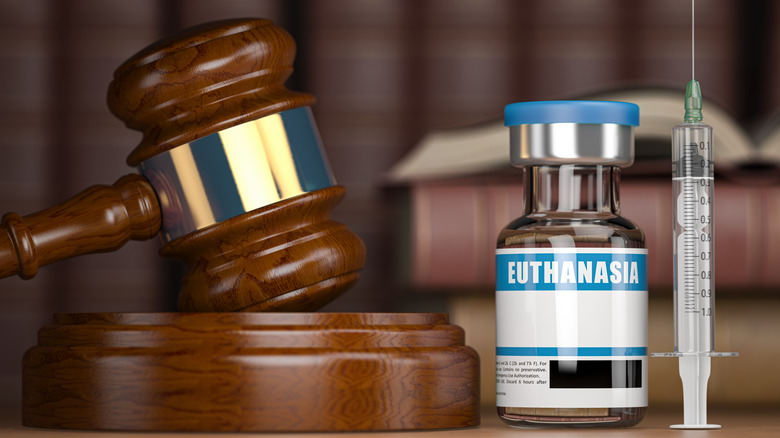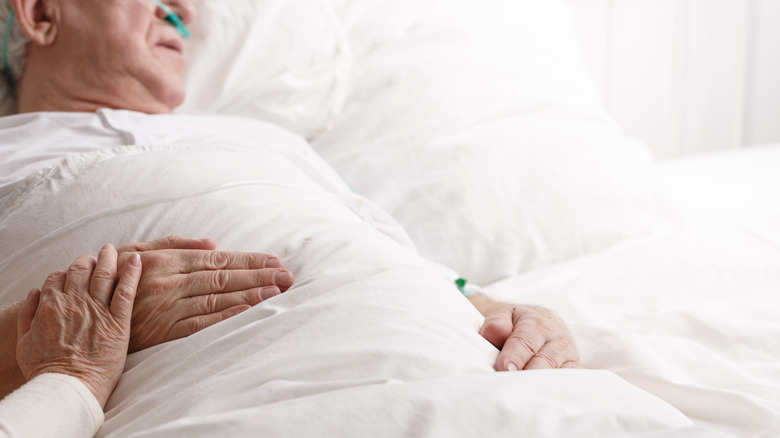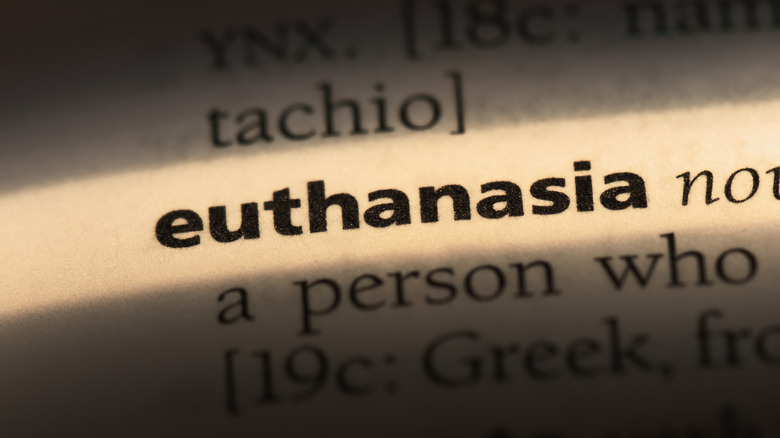The Complex Acquittal Of Dr. David Moor And The Issue Of Euthanasia
The following article includes information regarding euthanasia and physician-assisted suicide.
Dr. David Moor was a general practitioner known as the first British doctor who was tried for murder after he openly admitted to performing euthanasia on many of his patients. As reported by The Guardian, Dr. Moor had a private practice in Newcastle upon Tyne, and he gained a reputation for going the extra mile for his patients. By all accounts, he was well-liked by those who knew him. In addition to his practice, the doctor also wrote a column for a local newspaper and hosted his own show for a regional radio station. He was well-respected in the community until a revelation that he made regarding his practice that split public opinion.
During a radio interview, one journalist asked him about his thoughts on euthanasia. He stated that he assisted in the "pain-free" deaths of many of his patients. Soon after his revelation, he was arrested for the murder of one of his patients, an 85-year-old man named George Liddell.
What happened to George Liddell?
One of Dr. David Moor's patients was George Liddell, a former ambulance driver who had cancer of the bowel. As part of his treatment, Liddell had undergone surgery to remove a portion of his bowel. Some of the cancer couldn't be removed, and a part of his liver was also affected. But overall, the operation was deemed a success (via The Mount Sinai Journal of Medicine). After his recovery in the hospital, Liddell went home to live with his daughter, and Dr. Moor and a team of nurses continued to care for the patient.
After a while, however, Liddell's daughter and his nurses noticed that Liddell was depressed and in constant pain, which was caused by the cancer that wasn't removed during his operation. Dr. Moor gave him 5 milligrams of diamorphine at scheduled intervals to deal with the pain. As noted by Drugbank, diamorphine is commonly used to alleviate severe pain associated with surgical procedures. The medication helped for a while, but Liddell's pain returned. Dr. Moor doubled the dosage and eventually, the doctor and Liddell's family decided that it was best for the patient to be admitted to hospice care to assess his pain level. Liddell's health quickly declined, and Dr. Moor believed that his death was coming soon, per The Mount Sinai Journal of Medicine.
George Liddell's death
The nurses who cared for George Liddell thought that he was on the brink of death based on his declining condition. Dr. Moor changed the patient's dosage of diamorphine to 30 milligrams per day, which was given through a syringe. Dr. Moor was constantly checking in on the condition of his patient, and he believed that he was near death. On the day of Liddell's death, Dr. Moor called to check on Liddell, and he was told that although he was still alive, but he was making distressing noises that were similar to the sounds patients make when they are close to death, as noted by The Mount Sinai Journal of Medicine. He told Liddell's family that the patient didn't have long to live, and he administered medication to ensure that he died without pain. Liddell died on July 19, 1997.
It wasn't until Dr. Moor gave an interview a year afterward that his medical practice was investigated, as reported by BBC News. He stated that he gave his patients doses of diamorphine to ensure pain-free deaths, and he said the same during a television interview. Soon after, he became the subject of headlines. Still, Dr. Moor insisted that he was not a murderer, and he only administered diamorphine to relieve dying patients of pain and suffering.
Public opinion was split
Anti-euthanasia groups and the British Medical Association noted that as a doctor, Dr. David Moor did not have the right to hasten his patients' deaths. There were also others who displayed their outrage over what Dr. Moor had done to George Liddell and his other patients that he admitted to giving pain-free deaths. Euthanasia, as reported by the South China Morning Post, is not legal in Britain under any type of situation, and Dr. Moor was charged with murder and faced a sentence of life in prison. He stopped practicing medicine due to the stress that the case caused him.
However, Dr. Moor also had a large number of supporters that included his friends and patients who were with him throughout the ordeal. After his arrest, he received hundreds of letters that declared support for him. In an interview with BBC News, he said it was astonishing to see his supporters present in the gallery to back him up in what was one of the biggest challenges he had to face in his life.
Dr. David Moor's trial
The case focused on whether or not it was right or wrong to accelerate the death of terminally-ill patients in pain, per The Guardian. As noted by the BBC, Britain recognizes the double effect principle, which is mostly used in cases of euthanasia. Per the double effect, it is acceptable to do something good, even if it has a bad result, as long as the bad result wasn't intended. In Moor's case, his defense said (via the National Library of Medicine), "A doctor treating someone who appears to be terminally ill may find himself on a tightrope. If he gives a high dose of morphine, then there is the possibility that the patient's death may be hastened, if only to a short degree." Anthony Ryan, Liddell's son-in-law, took the witness stand and described Moor as "a remarkably good doctor." He also described the extent of his father-in-law's agonizing pain before his death.
As reported by the Independent, the jury took just a little over an hour to deliver their unanimous decision: Not guilty. His supporters rejoiced after the verdict was read. As he exited the courthouse, Dr. Moor said, "All I tried to do in treating [Mr. Liddell] was to relieve his agony, his distress and suffering."
The aftermath of the trial
Although he was acquitted of the murder charge, Dr. David Moor's close friends said that the doctor never recovered from the stress brought by the publicity and case against him. As reported by The Northern Echo, he was hospitalized due to internal bleeding soon after his trial ended. He also used alcohol to cope and was arrested for drunk driving. Dr. Moor died of a heart attack in 2000.
Today, euthanasia is still illegal in England (per the National Health Service). In 2021, however, the British Medical Association changed its stance on the matter. According to a report by The Guardian, the association decided that it is no longer opposed to euthanasia; rather, the members have agreed to a neutral stance. Representatives of the association were divided on the issue, and voting results were close. 49% of the members voted for neutrality, 48% were opposed, and the remaining 3% abstained. Trevor Moore, the chairman of My Death, My Decision — an organization that campaigns for the legalization of assisted dying — stated that the British Medical Association's decision is a breakthrough that may open doors to future changes in laws regarding euthanasia.
If you or anyone you know is having suicidal thoughts, please call the National Suicide Prevention Lifeline by dialing 988 or by calling 1-800-273-TALK (8255).





